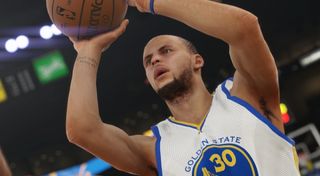Take-Two Defends Use Of Tattoos As Fair Use

Take-Two Interactive may be a litigious media publisher, but in turn the company also finds itself having to fight off tons of lawsuits as well, whether it be in relation to Grand Theft Auto or the NBA 2K series under the 2K Sports label. Speaking of the latter, Take-Two was sued for tattoos appearing in the NBA 2K series, and the company has filed a motion claiming that the appearance of tattoos in the game are fair use.
The Hollywood Reporter managed to do a report on the latest happenings involving the lawsuit, where tattoo parlor Solid Oak sued Take-Two over its ink work appearing in the NBA 2K game series on notable basketball superstars. Take-Two has offered a rebuttal in the form of "fair use."
The publishing giant argued that the ink is part of the real life person, and that the person is being depicted in the game as they appear in real life. Take-Two further states that Solid Oak never sought to trademark the ink, making the case more muddied.
Further in the publisher states that the tattoos aren't even a prominent part of the game and only appear on some of the 400 players featured in the NBA 2K games. It's also mentioned that even when the tattoos do appear they're so small and usually not the focus of the shot, meaning that it makes it difficult to tell exactly what the tattoos are.
According to Take-Two, 2K Sports is only using the tattoos in game as a copy to depict the real life basketball players and not to make money on Solid Oak's artwork.
The real standout statement is near the end of the article, where Take-Two's lawyers point out that Solid Oak has never licensed the art to any other party, and that setting the precedent now should also affect every other medium in which the NBA stars appear, such as television broadcasts, magazines, movies and TV shows. According to Take-Two's summary judgment motion:
If Take-Two's motion is denied, Solid Oak will be able to use that decision to shakedown each of the publications and television programs in which those players have appeared, as well as any other video game publisher that depicts the Tattoos.
It's a very salient point.
CINEMABLEND NEWSLETTER
Your Daily Blend of Entertainment News
If Take-Two loses this motion and Solid Oak manages to make a case here, then shouldn't this also affect every broadcasting station where NBA players with these tattoos appear?
And, even if there is some sort of loophole to exclude national television broadcasting stations, cable broadcasting stations, satellite TV, live telecasts, magazines, or movies from being affected, Take-Two does make a really good point about other basketball video games. What about Electronic Arts' NBA Live series? The EA Sports title also uses real life basketball stars, and what exactly would make EA exempt from the same legal ramifications?
It's a lot to think about, and The Hollywood Reporter rightly notes that this could set precedent depending on how things turn out here between Take-Two Interactive and Solid Oak tattoo parlor.
Staff Writer at CinemaBlend.

Corey Feldman Explains Why The Masked Singer Was An ‘Eye-Opening’ Experience, And I’m So Happy For Him

Paul Heyman Shares Who He Believes The First ‘Paul Heyman Woman’ Was, And Makes A Bold Prediction For The Modern Women’s Division

Tarot’s Jacob Batalon Tells Us About The Sneaky Spider-Man Photo He Took On Set, And The Warning Zendaya Gave Him As A Result
Most Popular





